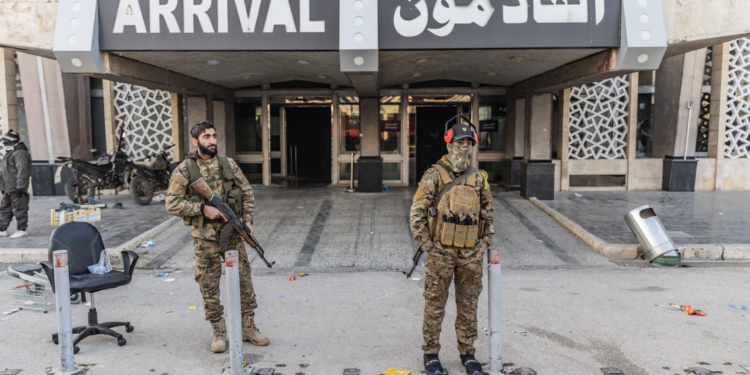The following is a short abstract, offering the main analytical findings and policy takeaways from a newly released Middle East Institute report on post-war reconstruction in Syria.
Since the United Nations announced the creation of an Early Recovery Trust Fund for Syria in March 2024, early recovery has emerged as a contentious topic among donors, policymakers, and international organizations. Central to this debate are the definition of “early recovery,” the fund allocation mechanism, and the implications for Syria’s political transition. Concerns among civil society actors have emerged that early recovery could serve as a way for the Syrian regime to bypass restrictions on reconstruction that the international community had imposed on Damascus to try to modify the regime’s political behavior at home. However, with normalization efforts gaining momentum in recent years, particularly from Gulf states and some European countries, fears have intensified that early recovery could further undermine the political viability of the reconstruction card as an avenue for achieving a meaningful political transition in Syria.
In light of and against the background of this political debate, MEI’s latest Study, “Inside Damascus’s Reconstruction Lab: Navigating the Framework of Return and Recovery,” co-authored by Munqeth Othman Agha and Muhannad al-Rish, examines the capacity of regime-controlled areas to effectively engage in early recovery and rehabilitation. It explores the political, legal, and economic frameworks the Syrian regime uses to control the dynamics of return and recovery activities, aiming to draw conclusions about the regime’s broader vision for nationwide reconstruction. Damascus was chosen as the primary case study due to the scale of its destruction and the variety of reconstruction projects undertaken there in recent years.
In the aftermath of the regime’s consolidation of control over Damascus in 2018, it has never applied any kind of comprehensive framework for the return and rehabilitation of conflict-affected areas. Instead, official decisions have been made locally by various governing entities and security organizations. This decentralized approach has left returnees vulnerable to extortion by local security personnel, criminal gangs, and contractors. Evidence gathered in this study suggests that the regime’s policy intentionally restricts return and rehabilitation in areas designated for pre-conflict urban development plans, focusing resources rather on “economically profitable” sectors and locations. The regime appears to regard current return and rehabilitation efforts as temporary measures until sufficient financial and political capital is amassed to pursue the pre-conflict urban development projects, which involve demolishing affected areas and replacing them with high-end residential and commercial developments.
Conflict-affected neighborhoods remain underserved, not only due to financial and security constraints but also as a deliberate strategy to discourage return, thus reducing resistance to future redevelopment plans and minimizing compensation to displaced property owners. In the meantime, returnees bear the financial burden of debris removal, property repairs, and basic service restoration.
The majority of current returnees come from within regime-controlled areas, where obtaining security permits is relatively more feasible. However, the return of refugees from abroad or internally displaced persons (IDPs) from opposition-held areas remains highly restricted and risky. Economic pressures, such as the desire to avoid paying rent in temporary locations, drive much of the internal return. Yet even for these returnees, challenges are significant: insecurity, looting, lack of basic services, financial strain, and limited access to legal support remain endemic. These difficulties have led some returnees to abandon their homes once again.
Given the regime’s reconstruction blueprint, a large-scale, regime-led rebuilding effort may do more harm than good. A more effective strategy could involve facilitating the low-risk return of IDPs from other regime-controlled areas. This approach might include small and micro-grants for returning IDPs, assisting them to rehabilitate their homes and revitalize local businesses. To make this strategy viable, leveraging financial, political, and legal tools is essential. This should include supporting civil society and grassroots initiatives, along with providing legal consultation for returnees. Donors must link political pressure and operational conditions to early recovery projects within regime-held areas. These conditions should guarantee the issuance of return and rehabilitation permits and enhance security in returning areas.
With a deteriorating economy, pro-regime actors are now competing for financial resources, turning local recovery and reconstruction into a race to seize lands and assets of displaced communities. For policymakers, donors, and implementing actors, understanding these dynamics within the regime’s network, including government bodies, security forces, militia leaders, and businessmen, is critical. These actors often have conflicting interests and visions for post-conflict recovery. Positive change can occur when legal and political pressure is applied, especially with the support of local residents. Strengthening the organizational capacity of residents, providing them with necessary tools, and mobilizing local elites willing to contribute to early recovery efforts are crucial steps forward.
Munqeth Othman Agha is a Non-Resident Scholar at the Middle East Institute, a researcher at the Syrian Memory Institute under the Arab Center for Research and Policy Studies, and a co-founder of the Syria Urban Research Project.
Muhannad al-Rish is a researcher and analyst specializing in security and humanitarian response in Syria, with a particular focus on the southern regions of Damascus, Daraa, and Suweida.
Photo by LOUAI BESHARA/AFP via Getty Images
The Middle East Institute (MEI) is an independent, non-partisan, non-for-profit, educational organization. It does not engage in advocacy and its scholars’ opinions are their own. MEI welcomes financial donations, but retains sole editorial control over its work and its publications reflect only the authors’ views. For a listing of MEI donors, please click here.











































